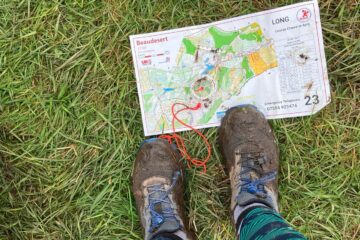A diagnosis of a long-term medical condition is an interruption to the humdrum and a call to adventure. Now, with the assistance of my trusty friend Duckie, I’m ready to tell my story.
Last week marked the fifth anniversary of the terrorist attack on the Manchester Arena in which 22 concert-goers – half of them under 20 – died and more than 1,000 were injured.
BBC Breakfast interviewed one of the survivors. Freya Lewis was 14 when she and her friend Nell Jones travelled from their homes in Cheshire to the Ariana Grande concert. Nell was killed in the attack, while Freya needed nearly 30 operations and extensive physio before she could walk again.
Watching her, I was blown away by her composure, her sense of humour and her complete lack of bitterness. And how far she has come in those five years. She has raised more than £67,000 for the Royal Manchester Children’s Hospital where her injuries were treated. It’s some journey.
Cringe. Yes, I know. The word ‘journey’ has become one of those irritating words like ‘iconic’ ‘hub’ and ‘strenuously denied’ that often make me want to throw something at the TV. Please bear with – the journey I’m thinking of here is not one you can plan, audition, or buy tickets for. It’s the one where something unexpected interrupts the humdrum of your ordinary world and you’re not the same person at supper as you were at breakfast. You go to Hell and back again, eventually returning to your original world with something new and positive.
Joseph Campbell (1904-1987) called this the Hero’s Journey. He observed that many stories from different cultures, religion and mythology followed a similar pattern or ‘monomyth’. Once you know where to look, you’ll find it underpins the screenplay of many films, most notably Star Wars and The Lion King.
My favourite example is Julia Donaldson’s story of Stick Man, a happy family man who, one sunny day, leaves his family (Stick Lady Love and their Stick Children Three) sleeping and goes out for an early morning jog in the park. A playful dog picks him up and the journey begins. A girl drops him in the river as a pooh-stick and he drifts further and further away from the Family Tree. He tumbles over a watermill and suffers the indignity of being used as nesting material, a sandcastle flag and cricket bat, among others. All the while he clings resolutely to his identity.
“I’m Stick Man, I’m Stick Man, I’m Stick Man, that’s me!
and I long to be back in the Family Tree.”
Then, when he is in most danger, Stick Man still summons up the compassion and energy for a huge act of kindness, and it’s the repayment of this that gets him home to his family.
Survive and thrive
While it’s not the same as a bullet or a bomb, a diagnosis of any long-term medical condition is still an interruption to the humdrum and a call to adventure. There follows a period of problem-solving, fighting demons and doubts, before one can emerge as a confident advocate and supporter for the next generation of travellers.
For the last 12 weeks I have been writing my own hero’s journey under the guidance of Robert Cochrane. I’ve written about him before (Jamming). He’s the magician who uses improvisation to improve the quality of life for people with Parkinson’s. It’s certainly working for me – when your life is so unpredictable, it’s handy to be able to think on the hoof and accept the challenge of the unexpected.
I’m part of the second cohort of Robert’s PhD research project Day One: Superheroes. Fourteen of us have been gathering weekly in a Zoom room to share our stories in the context of Campbell’s hero’s journey. When Robert asked me to consider myself a hero I thought – “Up there with Malala Yousafzai, Sully, mountain rescue and lifeboat volunteers? No way!” But Campbell’s journey has been a handy template for telling our stories. Robert encouraged us to develop superhero personas and write them into our own action movies. Here’s a trailer:
Duckie’s lovely sunny day is interrupted by bad news – her diagnosis turns her into a frightened, tearful ugly duckling. Along the river, she meets Swan [you know who you are], a close friend and mentor who says: “You must write!” Duckie doesn’t usually like ‘must’ and ‘should’ words, but this imperative is different. She loves writing and knows that it will be therapeutic, just as people with long-term illness find solace in arts and crafts and other creative pursuits.
For a while, Duckie is full of doubt. She gets entangled in the weeds of impostor syndrome, worrying that her writing isn’t good enough, or that she hasn’t had Parkinson’s long enough to offer an informed opinion. But as her audience grows, and with it her confidence, she [spoiler alert] takes flight as Daring Duckie Dynamo – a strong advocate ready to steer a new cohort of ugly ducklings through the choppy waters.
I found this exercise a really good way to articulate the elements of my own journey with Parkinson’s. Telling my story through the medium of a rubber duck (who knew?) has helped me to see inside my head without taking myself too seriously.
Robert will be publishing the results of his research later in the year. Meanwhile, do visit his site Yes, And… Exercise! to find out more about his weekly Jam for Joy sessions (currently Tuesdays at 18:00, UK time). Everyone is welcome – people with and without Parkinson’s, carers, health professionals, family members. Free, with a pay forward option.
Play > Heroes > David Bowie



6 Comments
Christine · 1 June 2022 at 10:13 am
I didn’t know the story of the Stick Man – I’ll look it up. And Daring Ducky Dynamo – what a great alter ego! Keep powering on
Rose Donaldson · 1 June 2022 at 2:09 pm
Ali this piece is gold! You have captured the description of Day One perfectly. Robert is our Sherpa and has helped me and obviously you to go through fears and fall outs from a Parkinson’s diagnosis. So glad you have found your voice again.
Kevin Murray · 1 June 2022 at 2:34 pm
Great stuff Ali!
Trish Judson · 2 June 2022 at 8:45 am
Your pieces always make me think and can be applied in different circumstances. Keep up the writing, it’s always interesting and helps us non sufferers understand the condition better.
Dani · 7 June 2022 at 1:10 pm
Brilliant, world needs more stick men!!
Rebecca · 28 November 2022 at 11:26 pm
I was diagnosed last week. I want to thank you for your writing and let you know how important it has been to me. At the moment, I am scared. Very scared. It helps to know that others are dealing with the same issues and can remain upbeat.